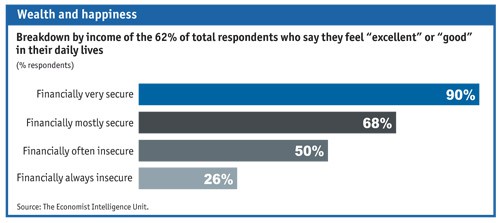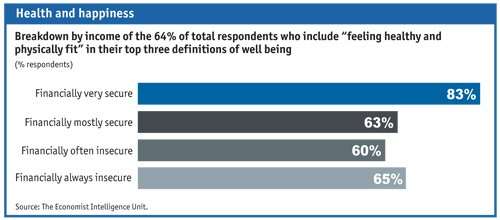
Money doesn’t buy happiness, but it is an important factor – both directly, by providing material comforts, and indirectly, by supporting an active approach to managing health and fitness
Does wealth buy happiness? The consensus of academic research is that it helps, although other factors play a more important role. In particular, the key to happiness is the freedom to manage one’s life, alongside physical health. That is especially true for women, many of whom juggle family obligations, work requirements and personal needs.
A survey conducted by The Economist Intelligence Unit (EIU) on behalf of Merck Consumer Health, and presented in the recently released study Women’s health and well-being: evolving definitions and practices, brings out the dilemma at the nexus of wealth and happiness.

On the one hand, the research finds a clear link between financial security and well-being (See box, Wealth and happiness). On the other hand, as income increases and basic concerns are met, the focus of professional women, particularly in rich countries, tends to shift toward managing stress from a busy lifestyle. That stress, for many, impacts well-being. Moreover, for cultural reasons, people in some countries, notably in Latin America, tend to report higher levels of well-being than their wealth levels or material conditions would seem to warrant.
Certainly, wealth is hardly the whole story when it comes to well-being. Indeed, the main factor in promoting well-being is health, not wealth, according to the EIU survey of 453 women in five countries (Germany, France, Brazil, Mexico and India). Nearly two-thirds (64%) of these women say that well-being means, first and foremost, “feeling healthy and physically fit”; wealthy women are more likely than poorer ones to define well-being this way. (See box: Health and happiness). In contrast, only 21% of respondents include “feeling financially secure” in their top-three definitions of well-being.

Follow the money
Those caveats aside – ie, that well-off women still have worries and stresses that impact their well-being, and that health is far more important than wealth as a hallmark of well-being – it is beyond doubt that wealth plays an important role in well-being. Tellingly, for example, of the minority of respondents who cite financial security as a hallmark of well-being, a far larger proportion (42%) are at the lower end of the income scale than at the higher end (15%). This suggests that if money is tight, then wealth, or the lack thereof, looms large in determining a woman’s sense of well-being.
A large body of academic literature supports the conclusion that well-being and wealth remain correlated well into upper income strata, far above the level at which basic needs are met. Justin Wolfers, professor of economics and public policy at the University of Michigan, finds that reported levels of well-being continue to increase with income even at a very high level – growing in tandem with a country’s level of income as well as with personal income.
“It’s a linear relationship,” agrees Ed Diener, a psychology professor and a senior scientist for the Gallup polling and consulting company. Based on survey results for American women, he says that that enjoyment – reflected in how respondents report on their current level of happiness – tends to plateau at annual household income levels of US$70,000-80,000, but that feelings of satisfaction – how contented respondents are with their lives in general – continue to increase with income right up to US$200,000 a year or more. In particular, he says, a 10% increase in income translates into an equal percentage increase in self-reported levels of happiness or well-being.
These results are not confined to the United States. Professor Daniel Sacks of the Kelley School of Business at Indiana University, in a report co-authored with Professor Wolfers and others, concludes that: “Well-being rises with income, whether we compare people in a single country and year, whether we look across countries, or whether we look at economic growth for a given country.” So, for example, households in India are likely to report similar correlations between wealth and well-being that can be found in the United States or Germany.
Staying in charge
To understand why wealth and well-being are so strongly linked – even well above the income levels at which basic needs are met – it is important to consider what the wealth buys. The EIU survey suggests that wealth gives women the freedom and space to concentrate on their well-being: financially secure respondents (98%) are far more likely than financially insecure ones (65%) to say they actively try to ensure a sense of well-being in their daily lives. The focus on health as a defining element of well-being comes into play as well. As noted above, well-off respondents (83%) are more likely than poorer ones (65%) to identify health and fitness as key to well-being. When asked what they do to promote their own well-being, 57% of the wealthier respondents say they are “physically active and try to stay physically fit”, compared to only 16% of the poorer ones.
The picture that emerges – of wealthier women more likely to manage their well-being actively, and better able to focus on activities such as sports that promote their well-being – crosses lines of culture and economic development. “Our readers’ concerns reflect the changes in India over recent years,” says Divesh Nath, editor of Women’s Era magazine. “For the first time a generation of young women have been educated and left home to work in cities, so our readership is relatively affluent. Women increasingly manage their own well-being, whereas a decade ago they would have discussed things in the family.”
In India, as elsewhere, wealth may not buy happiness. But it does enhance the freedom and ability of women to manage their lives and to promote their own well-being.




